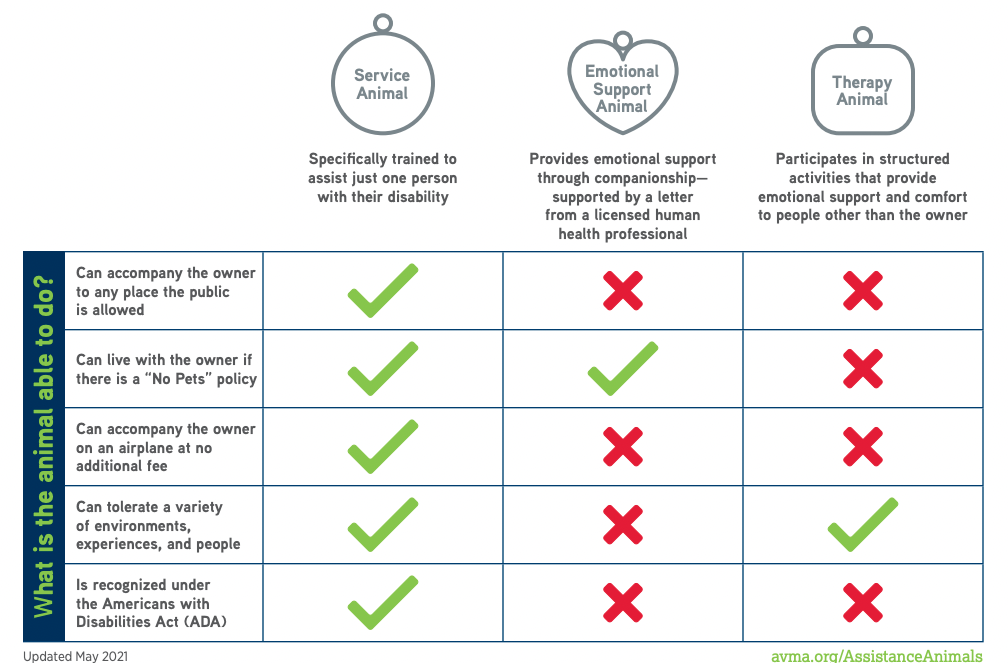Service Dog Facts...
The following is an attempt to build awareness and educate small businesses and the general public on current Service Dog (SD) laws and regulations. This is also meant to clarify discrepancies and miss/false representations of a service dog.
This is not an attempt to give legal advice. For further information, contact an attorney.


False Service Dogs
“False” service dogs are a growing problem throughout the United States. An individual presenting a false service dog is illegal and punishable by law in some states. A prime example is someone who purchases service dog ID’s or vests to board an airplane or gain special access to a business. This practice is illegal and considered a crime in some states. More importantly, false service dogs are tarnishing individuals rights that have legitimate service animals.
According to the US Department of Justice and the ADA (American Disability Act), Emotional Support Animals and Therapy Animals DO NOT qualify as a Service Animal. Only dogs and miniature horses qualify as Service Animals.
So how do you know if the service animal is legitimate? First, a legitimate SD team knows how to educate the public and knows how to answer specific questions regarding public access. Secondly, by observing the behavior of the SD or the SD “In training”.
Service Animal Laws / Animal Access
Many states have added amendments and state codes regarding service dogs. Check your state regulations. For example, MT code 49-4-214 (3) states: A person who is training a service animal is entitled to the same rights and assumes the same responsibilities granted to a person with a disability.
With regards to questions of “public access,” ALL service animals are allowed public access. If the business is open to the public then, they must allow access to service dogs.
There are two questions that business owners and/or staff are allowed to ask:
(1) Is the dog a service animal & required because of a disability?
(2) What work or task has the dog been trained to perform.
Staff cannot ask about the person’s disability, require medical documentation, require a special identification card or training documentation for the dog, or ask that the dog demonstrate its ability to perform the work or task.
Some airlines may ask for proof or documentation that the animal is a "true" Service Animal. Documentation from a Physician (like a prescription) or other supportive documentation usually suffices. Ask your airline if & what they require prior to your trip.
Allergies and fear of dogs are not valid reasons for denying access or refusing service to people using service animals. When a person who is allergic to dog dander and a person who uses a service animal must spend time in the same room or facility, for example, in a school classroom or at a homeless shelter, they both should be accommodated by assigning them, if possible, to different locations within the room or different rooms in the facility.
A person with a disability cannot be asked to remove his service animal from the premises unless:
(1) the dog is out of control and the handler does not take effective action to control it.
(2) the dog is not housebroken.
When there is a legitimate reason to ask that a service animal be removed, staff must offer the person with the disability the opportunity to obtain goods or services without the animal’s presence.
Establishments that sell or prepare food must allow service animals in public areas even if state or local health codes prohibit animals on the premises. Staff are not required to provide care or food for a service animal.
People with disabilities who use service animals cannot be isolated from other patrons, treated less favorably than other patrons, or charged fees that are not charged to other patrons without animals. In addition, if a business requires a deposit or fee to be paid by patrons with pets, it must waive the charge for service animals.
If a business such as a hotel normally charges guests for damage that they cause, a customer with a disability may also be charged for damage caused by himself or his service animal.
Not all disabilities are visible
Autism & PTSD-TBI Service Animals are listed as “Psychiatric” Service Animals according to ADA. A psychiatric service dog is a specific type of service dog trained to assist their handler with a psychiatric disability, such as post-traumatic stress disorder, schizophrenia, & autism.
Although service/assistance dogs have traditionally helped people with physical disabilities such as blindness or deafness, there is a wide range of other disabilities that an assistance/service dog may be able to help with as well, including psychiatric disabilities.
For more information regarding service dog laws and regulations refer to the
Department of Justice / Americans with Disabilities Act website & the full ADA Service Animal Requirements.


